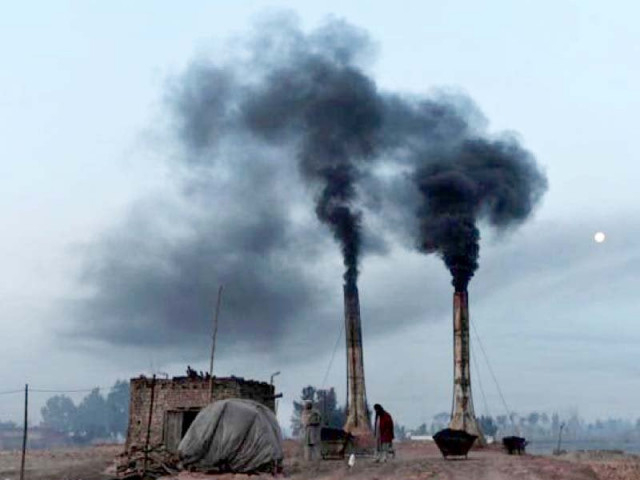Growing environmental abuse mars Faisalabad’s beauty
Pollution by hundreds of factories operating in the city causing serious diseases to citizens

Heavy industries in the city add to smoke pollution. PHOTO: EXPRESS
Pollution remains among the top challenges the world is facing after food, security and energy. People are experiencing domestic problems as their expenditure on healthcare has increased owing to pollution.
Similar situation exists in Faisalabad as rapid industrial growth in congested areas has created serious problems for the citizens. Hundreds of power looms and factories operate in this city due to which its yarn waste has enhanced the percentages of tuberculosis, cancer, hepatitis and respiratory diseases. Some cases of permanent ear infection have also been reported from areas infected by power looms.
Govt to install five ambient air quality monitoring systems
Heavy traffic on the roads has deteriorated the environment. More than five lac vehicles, over million motorcycles, rickshaws, and other vehicles are causing smoke and noise pollution daily.
Faisalabad was planned and rehabilitated in 1906 to accommodate 0.07 million people. However, the population rose to 4.5 million as per the census of 1961, which has now risen more being evident from its status of the third most populous city of Pakistan. On the other hand, the city is second in the country on the basis of most industries. With a number of industries come ample employment opportunities for the masses, therefore increase in migration to Faisalabad has been observed.
Agricultural lands are being converted into housing colonies around the city, eliminating greenery and causing inflation. This rapid conversion without any town planning aggravates environmental hazards in the city.
Astonishingly, a master plan was prepared in and approved in 1978 when the city experienced a number of changes. The proposed plan earmarked residential areas into the industrial areas without the connivance of the agencies concerned. The areas where roads were proposed were occupied by the encroachers.
Another master plan was conceived in 1986 by the Faisalabad Development Authority (FDA) but it still awaits administrative approval. However, the FDA is currently working on another plan to solve the alarming situation, keeping in mind the ground realities.
A leading architect of the city, Bahaudin Sadiqui, said that indifferent agencies concerned have made the city a mess. He blamed such agencies for allowing a mushroom growth of colonies, shopping centres and buildings without considering the impact on the environment.
Cleaning up development: Minister stresses pollution-free economic growth
He said that there was no high rise building in the master plan originally. There was no concept of commercial cum residential areas in the eight bazars of the city but now these bazaars have been converted into high rise buildings and plazas which has ruined the beauty, he added.
He said, “The open spaces which were meant for greenery and plantation have now been squeezed by the vehicles. One can hardly move in such bazars as the vehicles in these bazars are there all the time,” he regretted.
A senior citizen, Zaman Khan, while commenting on such sorry state of affairs of the city said, “The city would become unliveable soon. If the cases of industrial units and vehicles are not tackled wisely, the death rate in the city would double during the forthcoming years.” He said that citizens would face serious diseases owing to its haphazard growth and alarming rate of pollution.
Published in The Express Tribune, June 29th, 2017.


















COMMENTS
Comments are moderated and generally will be posted if they are on-topic and not abusive.
For more information, please see our Comments FAQ